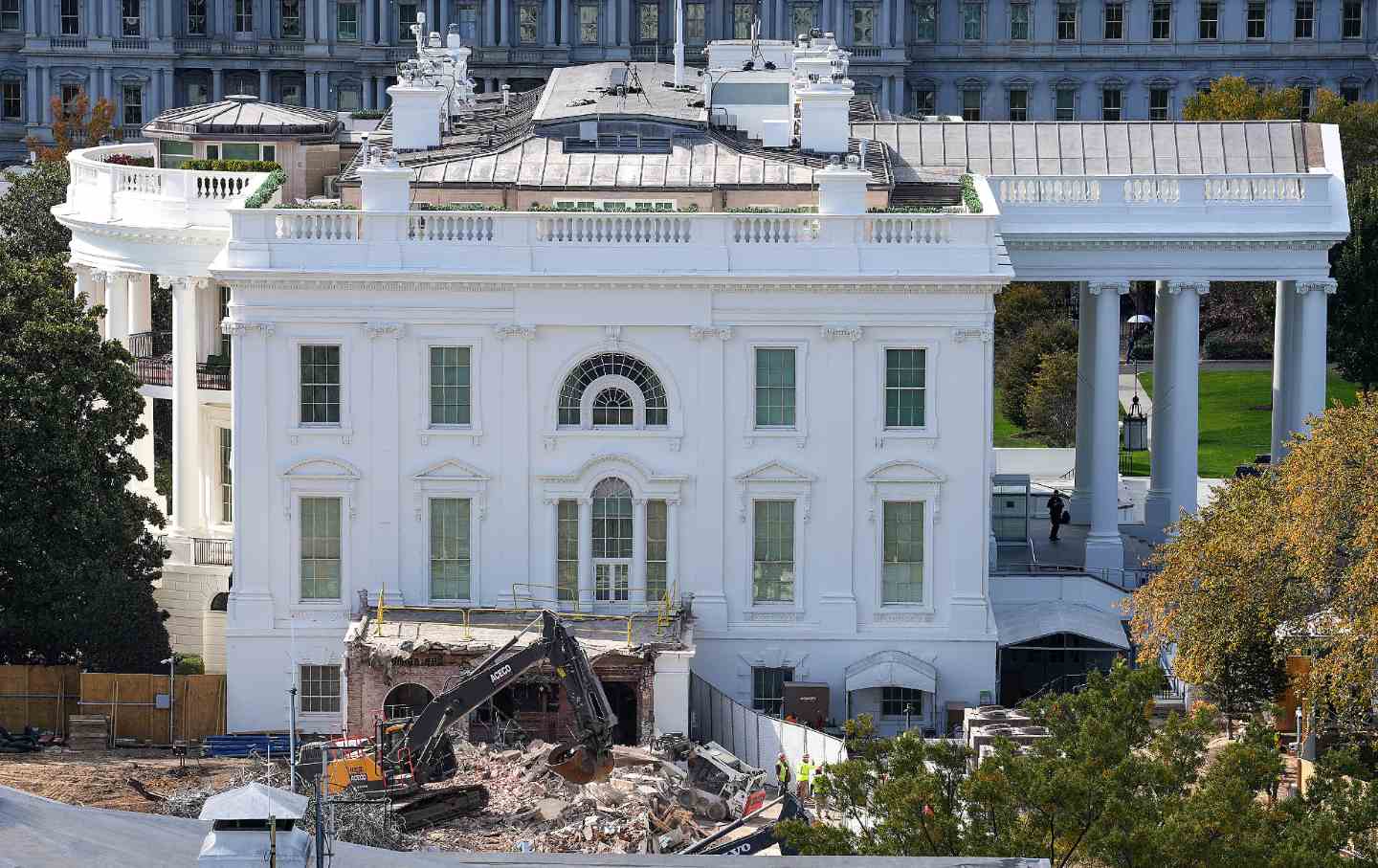Politics
/
October 24, 2025
Propping up Javier Milei’s austerity regime shows that Trump’s true loyalty is to neocolonial plutocracy.

US President Donald Trump greets Argentine President Javier Milei as he arrives at the West Wing of the White House on Tuesday October 14, 2025.
(Demetrius Freeman / The Washington Post via Getty Images)
Donald Trump loves cheesy musicals, a fact audible in the show tunes that pepper his rallies. He has a special passion for Andrew Lloyd Webber’s Evita (1978), a sweeping survey of the life of Argentina’s controversial populist leader Evita Perón. In his book Trump: Think Like a Billionaire (2004), the president calls Evita “my favorite Broadway show” and says he saw it six times in its original run.
The signature song of Evita is, of course, “Don’t Cry for Me Argentina.” Trump probably knows the words back to front. So it’s odd, but predictable, that he doesn’t seem to know what they mean, given that he is sending billions of dollars to bail out Argentina’s flailing economy while pushing belt-tightening during a government shutdown back home. In fact, one might be tempted to ask, “Why does Trump only cry for Argentina?”
Far-right Argentine President Javier Milei is a self-described anarcho-capitalist and admirer of the radical laissez-faire policies of the Austrian school of economics. But his attempt to carry out these destructive ideas has plunged Argentina into turmoil. While untrammeled austerity might please international investors, it has provoked fury among ordinary Argentines, which might manifest in the polls in national midterm elections on Sunday. In order to diffuse this anger of Argentine voters, Trump and Treasury Secretary Scott Bessent have taken extraordinary steps to stabilize the country’s currency, the peso. Tapping the Exchange Stabilization Fund, which is designed for emergencies, Bessent set up a $20 billion credit line for the Argentine government. He is working to secure another $20 billion in loans for Argentina from banks and investment funds.
Beyond that, Trump’s trade deals have turned out to be a boon to Argentine agriculture in a variety of fronts. As The Washington Post reported on Thursday,
Current Issue

Earlier this spring, Trump’s tariffs on China prompted the country to halt purchases of U.S. soybeans. Then he offered a $20 billion bailout to Argentina, whose soybean crop sales to China have replaced those from U.S. farmers. And this week, Trump announced that the United States would buy beef from Argentina to bring down prices for U.S. consumers, opening a rift between him and another bloc of rural supporters: cattle ranchers, whose top industry group on Wednesday disavowed the president as some Republican officials scrambled to talk Trump out of the plan.
The bailout has alienated some of Trump’s supporters and provided an easy target for his foes. Christian Lovell, an Illinois cattle farmer and the senior director of programs at Farm Action, told CNN, “If Trump goes through with what he outlined, I do believe it’s a betrayal of the American rancher. It’s a feeling that you’re selling us out to a foreign competitor.” Trump countered these complaints with a Truth Social post saying that the “Cattle Ranchers, who I love” should be grateful for all he’s done for them.
Things are not much better in private, where GOP lawmakers have reportedly been trying to get Trump to reverse course. One exception to this approach of quiet diplomacy is Georgia Representative Marjorie Taylor Greene, who is not famous for her tact. Appearing on Tucker Carlson’s online show on Wednesday, Greene described the Argentina bailout as “one of the grossest things I’ve ever seen.” She added, “I have no idea who is telling our great president, our ‘America first’ president, that this is a good idea. Because, honestly, it’s a punch in the gut to all of our American cattle ranchers, and they are furious and rightfully so…. I don’t know how that’s ‘America First.’”
Vermont Senator Bernie Sanders, although the ideological opposite of Greene, raised a similar objection. Alluding to the Argentine bailout, Sanders asked, “What happened to America First?”
It’s tempting to describe Trump as abandoning America First for Argentina First. But it would be more accurate to say his solicitude toward Milei reveals the true nature of America First, which has less to do with strengthening the United States than with bolstering the power of Trump’s investment-class allies by supporting plutocrat-friendly regimes.
As columnist Ishaan Tharoor notes in The Washington Post, Trump’s decision to bolster Milei is of a piece with his previous interference in foreign elections to give a shot in the arm to right-wing populists, notably in Hungary in 2022 and Poland earlier this year. Further, part of the creed of Trump’s America First is that the United States needs to focus more on the Western Hemisphere, rather than on wars in Europe or the Middle East. Trump’s Argentina actions are in keeping with his other moves to intensify intervention in Latin America, notably the current push for war in Venezuela.
When Milei visited the White House on October 14, Trump explained his action as motivated by ideological affinity: “It’s just helping a great philosophy take over a great country. Argentina is one of the most beautiful countries that I’ve ever seen, and we want to see it succeed. It’s very simple.” Even more explicitly, Bessent has praised Argentina as a “beacon” that, if successful, will push other Latin American countries to the right.
Trump is not bailing out Argentina; he is bailing out Milei. Or, to be even more precise, he is bailing out the international investors who need their gamble on Argentina to pay off. In addition to the line of credit set up by the United States, Argentina is the world’s largest debtor to the International Monetary Fund (IMF), having recently borrowed $20 billion on top of an existing debt of $43 billion. Like the Trump administration, the IMF is enthusiastic about Milei’s austerity program. Under Milei, Argentina is, as economist Delfina Rossi pointed out in Jacobin, caught in a classic debt trap, with payments to foreign creditors putting a tight ceiling on social spending.
Speaking to John Cassidy of The New Yorker, Maurice Obstfeld, a former chief economist at the IMF, argues, “What’s worrisome here is that Bessent is repeatedly saying we will be there for the long term and we will do whatever it takes. He is effectively saying to foreign investors, ‘You will be able to get out whole.’”
There is a strong conflict of interest in this situation because Bessent has many long-standing ties to international finance. Bessent’s promise to make good the debts of the Milei government is welcome news, Cassidy notes,
for American hedge funds that have been investing in Argentinean assets. One of these funds is Discovery Capital Management, founded by the investor Robert Citrone. At the end of last month, the journalist Judd Legum pointed out that Citrone is a former colleague of Bessent’s from 2013, when they both worked for George Soros. Subsequently, the Times reported that Citrone was “in close contact with Mr. Bessent in the lead-up to the Treasury announcement last month.”
Popular
“swipe left below to view more authors”Swipe →
Trump’s bailout of Argentina falls into the larger pattern of self-dealing that has characterized his corrupt administration. It’s of a piece with the questionable business ties his family members have set up with Arab autocracies and dubious crypto firms such as Biance (whose founder, Changpeng Zhao, was pardoned by Trump on Thursday for a money laundering conviction). There is no policy of America First or Argentina First—only Trump First.
More from The Nation


Demolishing the people’s entrance to the People’s House is part of Trump’s plan to destabilize and devastate his opponents.
Joan Walsh

A ceasefire is only the beginning. Without justice, there can be no peace.
OppArt
/
Andrea Arroyo

The demolition of the East Wing is a symbol of a system that long ago stopped caring about the kind of blatant graft that Trump loves.
Chris Lehmann

From Pete Buttigieg to Gavin Newsom, party bigwigs are finding out the hard way that the old platitudes don’t work anymore.
Y.L. Al-Sheikh


